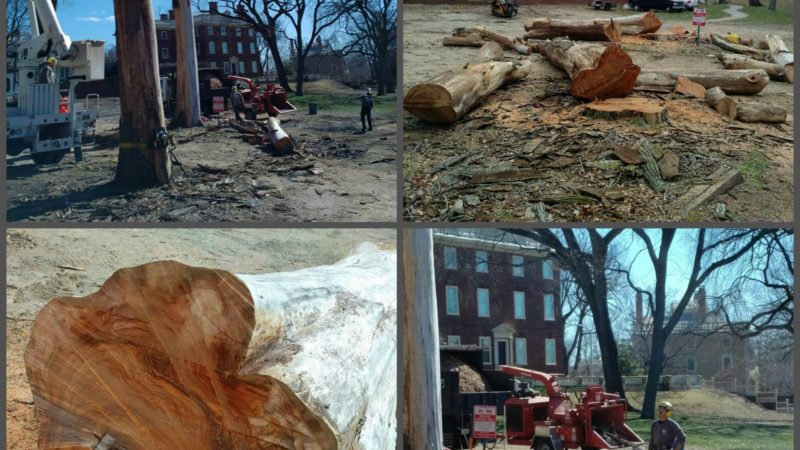
Of interest to our members, friends, and supporters: We regret to announce that the Rhode Island Historical Society was forced to remove four more dead elm trees from the John Brown House Museum property. The RIHS hired TF Morra Tree Care, Inc., to handle the removal (as well as, potentially, a replanting strategy of more varied and disease-resistant trees in the coming months and years), and as this stage of the project draws to a close, we present Executive Director C. Morgan Grefe‘s official statement on a painful decision that wasn’t really a decision at all:
Last week at the John Brown House Museum we had the sad task of removing four more of our elm trees from the Sharpe Elmgrove. It was with heavy hearts, and even heavier minds, because we knew there was no other choice: They died this past year and, as many of you saw, they began dropping their bark this fall. By this winter, they were largely bare.
As usual, we sought to share this wood with artists; this time, Prof. Richard Fishman at Brown University.
What weighs so heavily on us is that as sad as it is to see these trees go, we know that there are more infected with Dutch Elm disease, and despite our best efforts, treatments, prophylaxis, more of the trees are infected. Given their size and age, it is very hard for them to fight this off.
As always, I seek to be philosophical about this process and use this moment of loss also as a chance to look toward the future. This very landscape, newly open, has been many things in past. A forest, a field, a site for multiple houses. In fact, before the Olmsted Brothers firm came in around 1900, a mansion the size of the John Brown House occupied the corner of Benefit and Charlesfield Streets. Now we must look at this magnificent, open urban expanse and decide what should be planted there next. How will people use this space? What should our landscape legacy be?
We thank these grand trees for all they have done for us, and we will continue to fight for those that remain. All the while, we will be thinking of what is the next life for our urban landscape.

